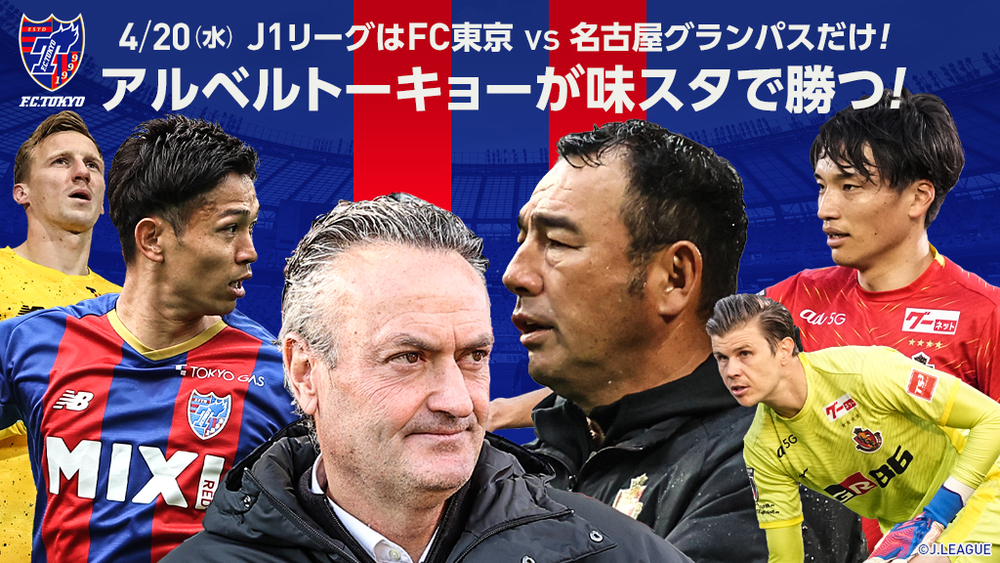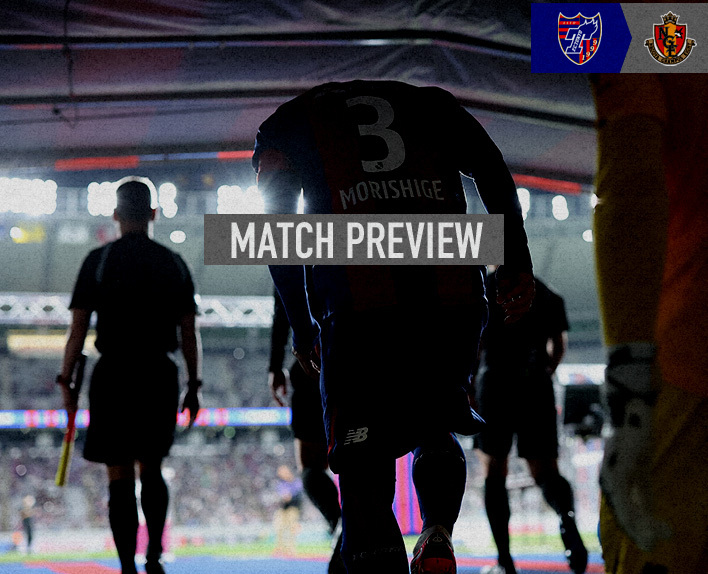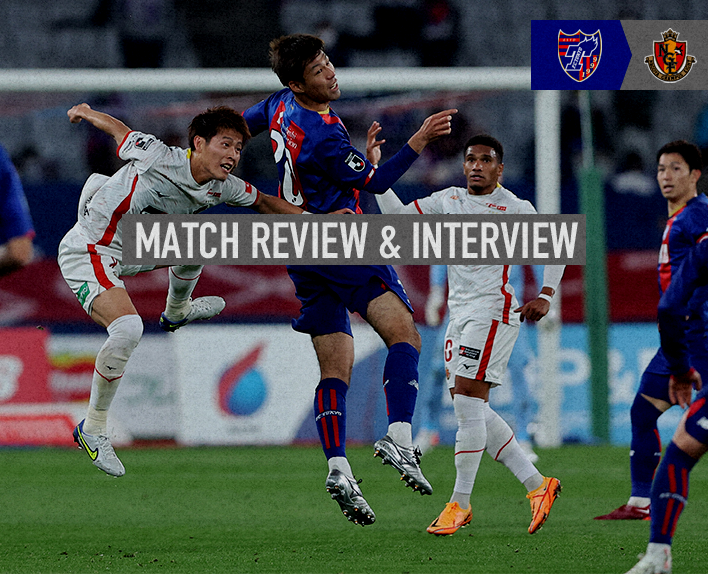[Albert PUIG ORTONEDA Interview]
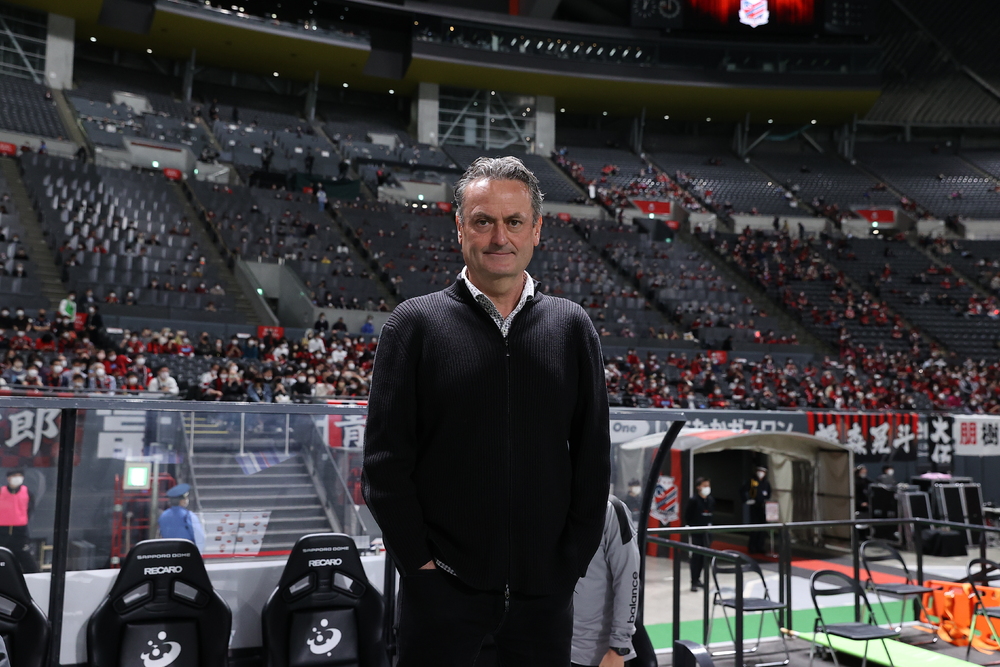
Q, I always hear that our growth is important. Please tell me your impression of Nagoya Grampus.
A, what I want to convey to all of you again is that our mission this season is to gradually establish a new playing style. And of course, since we are in the professional world, we are promoting growth while focusing on achieving more victories and points in this growth stage. Of course, we want to connect the players' characteristics to points while bringing out their strengths. The goal of this season is to promote the team's growth while effectively utilizing the current players' characteristics. With the cooperation of Mixi, we hope to reinforce the team with better players and expect to move on to the next phase in the coming season. As for the Levain Cup, we want to give opportunities to young players. To confirm their potential, we need to see them play in official matches. We also want to give playing time to players who haven't been given much opportunity. That is the rough direction of this season.
After considering this season, we must capture the characteristics of the opponent's game and come up with a game plan. For example, in the previous match against Sapporo, I interpreted it as a good overall game. Sapporo is a very difficult opponent. It is difficult to play against a team that comes with a man-to-man marking style. And, although it was only a little, we were able to surpass them in possession rate. There were also a few close calls, but Kubo (SLOWIK) made fine saves to stop them. We also had decisive chances towards the end of the game, but we couldn't score due to a few centimeters difference. We will be playing against Nagoya tomorrow, and I think they are a dangerous team. However, our players have been consistently playing with a strong determination this season. Tomorrow, we also want to consider the opponent's characteristics and promote the growth of our team. At the same time, we want to bring out the strengths of our players and aim for another victory tomorrow.
Q: How satisfied are you with being able to have a competitive match against a strong opponent like Sapporo.D?
A, there are times when the game plan works well and times when it doesn't in each game. Naturally, many people interpret whether the game plan worked well or not based on the match result. For example, if Sapporo's decisive chance was not stopped by Kubo and resulted in a goal, some people might think that the game plan was wrong if we were losing. However, in the field, there are often situations where the game plan was accurate but the match result did not go as expected. For example, Hiroshima was also a team that came with intense press from the front line, just like Sapporo. We were able to achieve victory against Hiroshima, but it cannot be said that the game plan worked well, and we were not able to play as we expected.
Regarding tomorrow's Nagoya match, we have a different playing style. As for the players' positions, there may be similarities with Sapporo, but there is a clear difference in playing style between the two teams. Although the playing style is different, Nagoya has a lineup of high-quality players. In that sense, I think it will be very difficult to earn 3 points from them. However, the players have been practicing well to achieve good results through good play. In that sense, I can calmly and confidently face tomorrow's match.
Q: At the beginning, you said that the completion level was about 20%. I think you set 100% as the level to win the AFC Champions League (ACL). What is the current completion level of the team?
A, 25%. If we can reach a completion rate of 50% to 60% by the end of this season, I think it will be a success. However, the completion rate of the team and the number of victories are different matters. I am 100% satisfied with the players' commitment to winning and the results they have achieved. The completion rate of the team and the players' commitment, and the satisfaction with the points are completely different evaluation criteria. The players are committed to winning and playing the game. Their attitude in fighting, both when they have the ball and when they don't, is also part of their effort. In that aspect, I am satisfied beyond 100%.
Q: Is there a proportional relationship between results and growth?
A, of course, there is no proportion. However, victory is a presence that promotes growth. Because if you win the game, the players' trust in the team increases. I think the fans and supporters will be more satisfied. And the media will also criticize me less. Therefore, it is certainly better to win the game.
Q, what is the most important thing you focus on to promote growth?
A, there are almost no secrets to promoting growth. Growing a team is similar to cooking. First, time is necessary. Adjusting the heat is also necessary. The distribution of salt is important as well. Even if the cooking method is the same, there will be a significant difference in the completion of the dish between fresh fish and fish that has been frozen for many years. That's the image.
Q: What will be important to break Nagoya's strong defense in the last two matches?
A, I think it will be key to follow the spaces they create in which zone. However, the opponent often defends by creating a block with 8 field players, which makes it difficult to break through. They also have high-quality players. Their dangerous points are not only in defense but also in the attacking phase, so I think it will be a difficult match. Depending on the development, Nagoya may surpass in ball possession rate, but we want to focus on the game and play tomorrow. We want to continue fighting for 90 minutes until the end of the match as we have done so far.
Q: Is there anything that Coach Hasegawa, who was in charge until last season, is conscious of?
A, Hasegawa, the former coach of FC Tokyo, does not consider it important. However, I think he is a great coach. In that sense, it is important that he leads the team. He definitely has a deep understanding of Japanese soccer than me. In addition, he is also a coach who has won multiple titles so far. In that sense, I definitely expect tomorrow's game to be difficult.
[Player Interview]
<Yuto NAGATOMO>
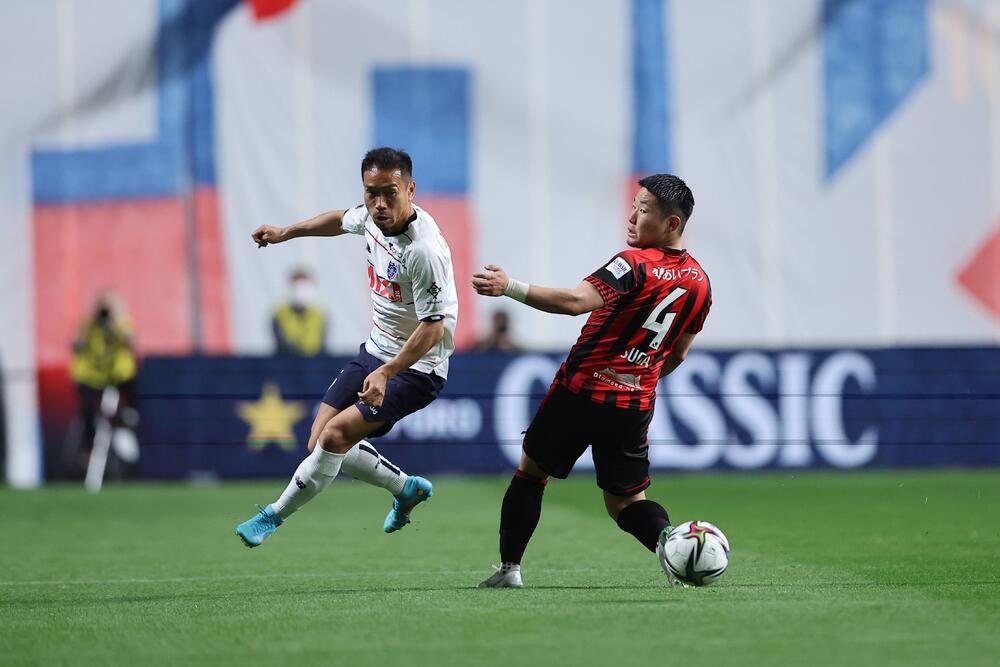
Q: How do you feel about your progress while working on a new style?
A, I feel that I am understanding and absorbing the coach's new tactics, and I am also growing on the pitch. There are still many challenges, so I am working every day to absorb everything.
Q, how do you feel about trying out new moves like narrowing down and inner wraps, which are different from your usual style?
A, recently, I've been addicted to playing inside (laughs). I had so much fun, really. The game is really enjoyable. I used to think that running up the side lane was the role of a full-back, but modern soccer is changing, and what the coach is asking for is also changing, so I need to understand the coach's tactics well and be able to play inside now. I've played with various coaches overseas, so I don't think it will take me that long to adapt, and I think I've actually been able to embody it on the pitch.
Q, it is valuable to be able to experience new things at this age, isn't it?
A, Is there any age-related thing? Rather, as I get older, I become more flexible and I also have a desire to learn from young players. Isn't it the opposite pattern? It is my own sense that getting older makes me more flexible.
Q, how does the team's situation look from an objective perspective as you work on a new style?
A, I am challenging myself with new things, and it's not that easy, but I feel a sense of growth. Everyone is enjoying playing, and I am too. I think enjoying is the most important thing and it contributes to growth, and I think it affects the speed of growth. I still feel that I can continue to grow.
Q: Is it the mind that gets tired more than the body?
A, no, I'm not that tired. It's not that I'm not tired at all, but I can play soccer with good positioning, so physical fatigue doesn't come heavily in the latter part of the second half. Because my physical condition is good, my mental fatigue is also reduced. It's about being able to play good soccer, being able to position myself well. It's also because my own condition is good, but the soccer I'm playing is in a place where physical fatigue is less likely to occur.
Q, it is fun to play in the center, and it is the feeling that I am able to receive the ball in a good form precisely because I am in a good position.
A, because it is a sport that is played with 11 people, not just by oneself, I am always conscious of which position I can connect with. Until now, I have been playing wide, so there have been times when the distance between me and the center was far, or conversely, I took a position that was too close and troubled my teammates. Looking back now, I realize that. I can play with a good sense of distance inside, and of course, it is necessary to open up and take width depending on the situation of my teammates and the opponent, and I feel growth in being able to play while overlooking soccer. I think that enjoying it is about those aspects.
Q: Tomorrow's match is against Nagoya, and Kenta HASEGAWA, who fought together last season, is in charge. Do you have any thoughts on that?
A, there is also the fact that if Kenta-san did not desire me, I would not have been able to return to Tokyo, so I feel grateful to him for being able to come back to this wonderful club. On the other hand, there are also complex feelings of not being able to contribute to Kenta-san's team. Now, I will fight as an enemy, but I am determined to show what I have learned from Kenta-san in the short time and my own growth.
Q: You mentioned that you want to learn from young players, but Matsuki has been playing since the beginning of the season. Are there any aspects in which you are inspired by him?
AFirst of all, I think the most important thing to succeed as a professional is mentality, and he has that fearlessness. No matter what stage he plays in the future, I think that mentality will help him grow and lead him to even greater heights. It's reliable to have that. I'm about twice his age, but I think his dignified behavior that doesn't make me feel that is his strength. I'm desperately watching him to absorb that.
Q: After the set play against Sapporo, there was a scene where you strongly stopped the opponent around the halfway line. Is this the best condition you have been in since returning last season?
A, both mentally and physically, I am in a good state and still improving. I think there are various factors, but since returning to Japan, I have been active in the national team and there has been a congested schedule. Also, having played overseas for 11 seasons, I finally feel adapted to the environment in Japan. I have also adapted to the J-League.
Q: You have been frequently used as a right full-back, have you gotten used to it?
A, right, it's fun. I've been playing on the left all this time, and occasionally I played on the right, but I honestly had a sense of weakness thinking "the right side is not interesting". However, now I'm really enjoying it, thinking "the right side is so much fun. Why haven't I been doing this until now" (laughs). It's not just about the condition, but I think I can strive for high-quality play.
Q, with this style, even when the ball is taken away, I feel that I am able to switch and recover well because my positioning is good.
A, because I often take the inside, it's really difficult to go up unless it's a really good timing to go up, and in that sense, the quality of judgment on countermeasures and decisions on where to go and where not to go has also improved, and I think that's largely because of good positioning and being able to play with ease. When I tighten to the inside during defense, the opponent also has a hard time countering, and I don't feel like I'm being beaten because I can confront the opponent in a good state.
<Shuto ABE>
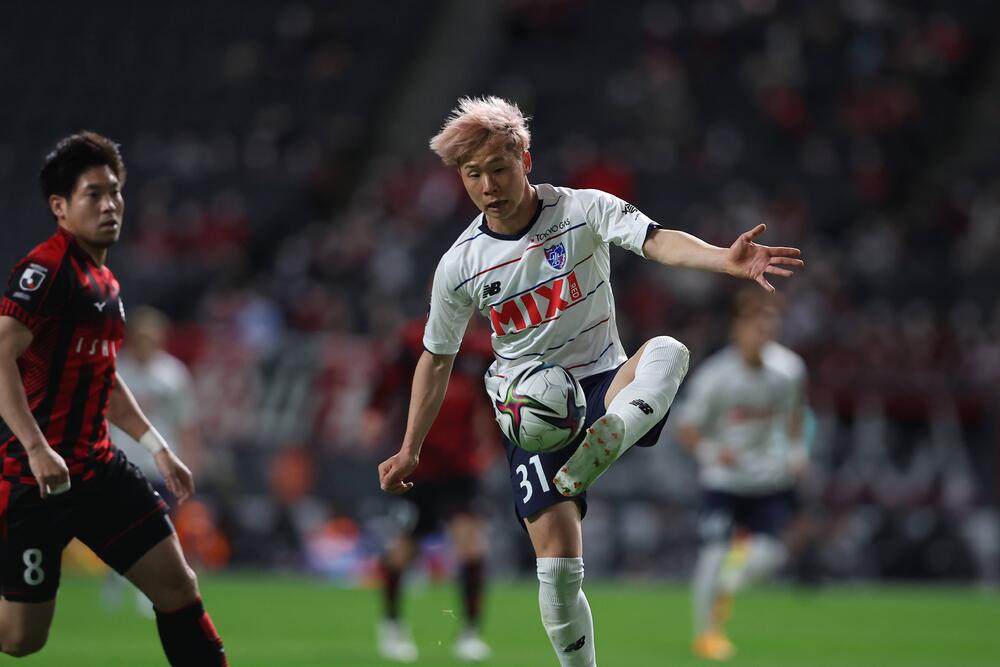
Q: In the league matches, we had back-to-back scoreless draws in the 8th round against Urawa and the 9th round against Sapporo. How do you perceive these results?
It is a matter of reflection that we have not scored in both matches. There were moments when our build-up from the back, which we have been working on this season, went well, but overall, I still think there are many challenges. However, we have been able to unify the image of the soccer we aspire to as a team. I believe it is important to continue challenging without fear of failure and to connect it to growth.
Q, in terms of defense, do you feel a sense of accomplishment in keeping a clean sheet in both matches?
Both Urawa and Sapporo are completely different teams in terms of their playing style, so I consider it a positive that we were able to keep both teams from scoring. Under the guidance of Coach Albert, we have been working on organized defense, and I believe we were able to demonstrate some of the results on the pitch.
Q, Coach Albert Puig always emphasizes the word "growth". Do you feel the team's growth?
A, I feel that the team's completeness is increasing as we play more games. However, even if the content is good, I will feel frustrated if we don't win, and I don't think the fans and supporters will enjoy it. I want to focus on the results and continue to grow while winning the games.
Q: This week's match is against Nagoya, led by coach Kenta HASEGAWA. How do you feel about it?
A, I am grateful to have received guidance from Coach Hasegawa for the past three years since I became a professional. With the intention of repaying that favor, I want to show my growth and win.
Q, please share your enthusiasm for the game with the fans and supporters.
A, your passionate support is our motivation. We will do our best to return the energy we receive through our performance and results, and aim to win 3 points without fail. Thank you for your support this match as well!
Matchday program is available here!
